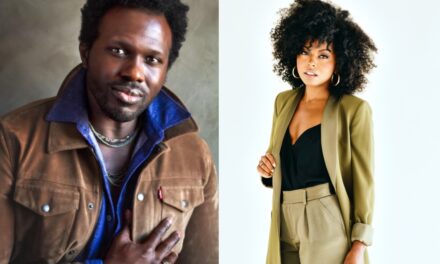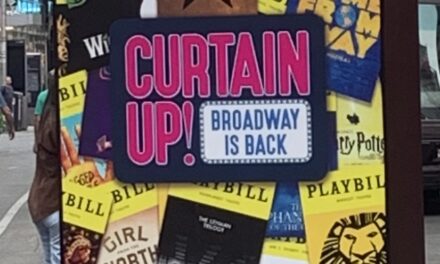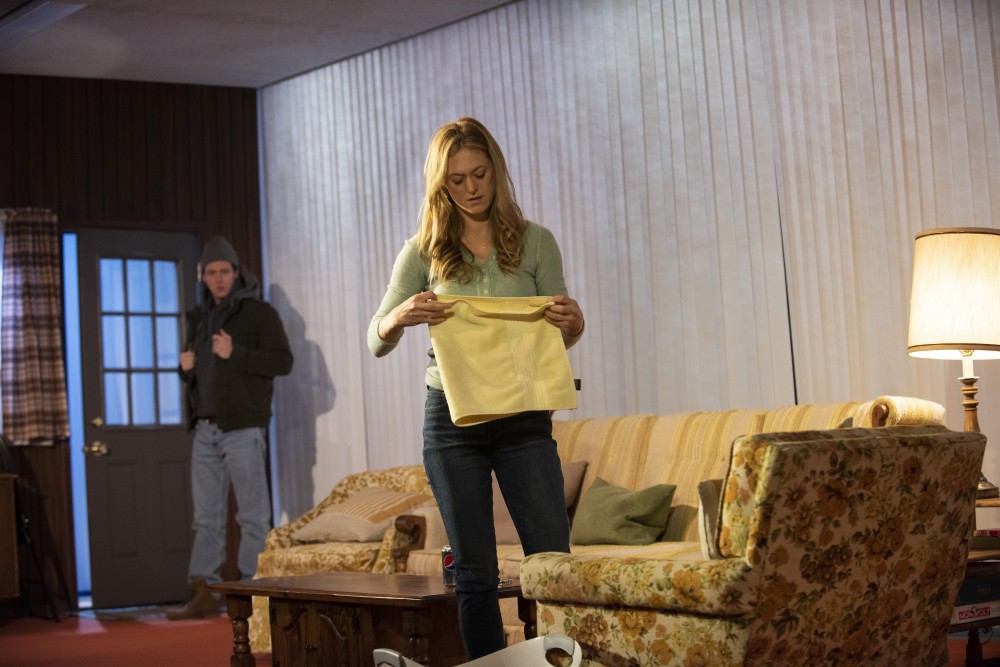12 Fun Facts We Learned about The Producers on Stars in the House
by Matt Smith . . .

It was certainly “Springtime” for Mel Brooks and alumni of The Producers on April 19th when the 12-time Tony-winning smash hit celebrated its monumental 20-year anniversary. To mark the occasion, two days prior, theatre personalities Seth Rudetsky and James Wesley gathered several original cast and crew members on their equally-acclaimed quarantine variety show, Stars in the House, to dish on their experiences with the production and see, smell, touch, kiss and revel in its overall lasting impact and as-yet unbeatable success. Along the way, the panel — which included cast members Nathan Lane, Matthew Broderick, Cady Huffman, Brad Oscar, director-choreographer Susan Stroman, and even a surprise appearance from Brooks himself (!!!!) — shared personal stories and divulged a few backstage secrets. In honor of the show’s historic Tony win, here are 12 of our faves:
1. Intermission at the first New York preview was 45 minutes long.
“Getting the set into the St. James [Theatre] was a whole ‘nother thing,” says Susan Stroman, who attributed the movement of the massive white set at the top of Act II — the one Ulla paints at Intermission, which had to be flown out before it could be flown in — to the delay. “I remember coming out and saying to the audience, ‘We’re going to be a little longer than normal… you should go get a drink.’” The stage manager then signaled it would take longer, so Stro turned back to the crowd and quipped, “Or maybe you could have dinner.” Guess “quick painting” is one skill Ulla can take off her exhaustive resumé!
2. The St. James Theatre was so cramped that the orchestra needed to split up.
“We were in the pit,” says Stars in the House host Seth Rudetsky, who served as the show’s assistant conductor early in the run. “But we had the harp and the percussion up on the seventh floor.” To which Nathan Lane, ever ready with a one-liner, deadpans, “And the string section was in a condo on the Lower East Side.”


3. It’s good to be the king, but Brad Oscar travelled quite the road to get to that point.
Haben sie gehört the story of Oscar’s meteoritic rise in the show? “I came in at the very last minute,” the actor details. “The show was fully cast. I literally auditioned the week after Thanksgiving.” (The show was set to begin rehearsals a week before Christmas). On leave from Broadway’s Jekyll and Hyde playing Santa Claus in a touring production of the Radio City Christmas show, Oscar was initially called in to audition solely as the standby for Max Bialystock. “[I thought], ‘Oh my God, what a dream! To cover Nathan, and be a part of this experience and the whole [phenomenon],’” he recalls, adding that it was only when he walked into the audition room that the creatives asked him to read Franz Liebkind as well. They liked what they saw, and as a result, “I walked into the rehearsal room on that first day, [and] I was covering Max and Franz and Roger DeBris and all of the character men in the ensemble… and having a total nervous breakdown.”
If that wasn’t enough of a whirlwind, when Ron Orbach, the actor originally playing Franz — who breaks his leg moments before opening and can’t perform in Springtime for Hitler — ironically injured his knee during one of the show’s early out-of-town tech rehearsals, Oscar was called to fill the vacancy in the role just three days out from the first preview.
“I was involved in the final tech rehearsals, the final dress rehearsals… all of it,” he says. “So, by the time we got into performance, I felt like I could own it a little bit and wasn’t just going on as the understudy with two hours notice.”
As we all know, when surgery prevented Orbach from returning, Oscar was permanently given the role of the hop-clopping playwright upon transfer to New York… while still retaining the role of understudy for Max.
And with over 75 performances as Max during Nathan Lane’s tenure, following the infamous firing of Henry Goodman (the original replacement for Lane), Oscar was undoubtedly the one to call.
“Brad can do anything,” says original Leo, Matthew Broderick, who played opposite him when Lane was away, praising his grace and ease in dependably “stepping up to the plate.” Referencing all the players in their boxes on the Zoom call, he joked, “He could be any one of these squares.”
In the end, he clocked in over 1,000 performances as the obnoxious impresario, playing the role on Broadway, in London, in Las Vegas, and on tour. Phew!
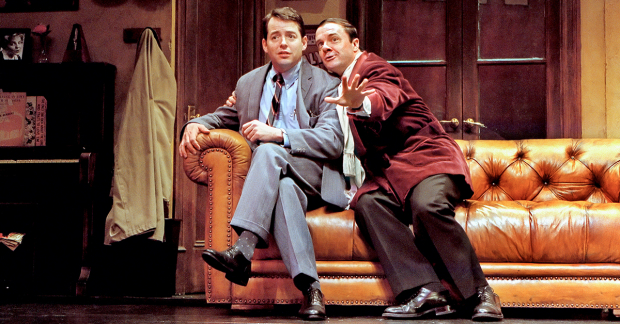

4. Some big-named heavy-hitters were involved at the start.
Producer David Geffen — who originally coaxed Mel Brooks into adapting his beloved cult film into a Broadway musical — initially suggested Jerry Herman as songwriter. Herman wasn’t having it. “You’re another Irving Berlin,” he told Brooks after a meeting, telling Geffen, “You’re crazy if you don’t let him do it.” On a similar note, Jerry Zaks was one of the first approached to direct. In fact, it was Zaks from whom Lane initially heard about the show. (“He told me Mel came to him singing, ‘We can do it, we can do it!’” Lane recalls). Consumed with personal business, Zaks ultimately passed on the project, and Stroman (then working jointly with husband Mike Ockrent) took the baton.
5. Martin Short was the original choice for Leo Bloom.
“Marty had just finished doing Little Me in New York,” says Lane, “and didn’t want to make another long commitment and be away from his family” in Los Angeles, a requirement to complete both the out-of-town tryout in Chicago and the subsequent blockbuster production in New York. “So, the part opened up…” and we all know who nabbed it in the end. They were fated to be mated, after all. And Short eventually got the chance to take on the mousy accountant opposite Jason Alexander, when the production opened in Los Angeles in 2003. A happy ending for all!
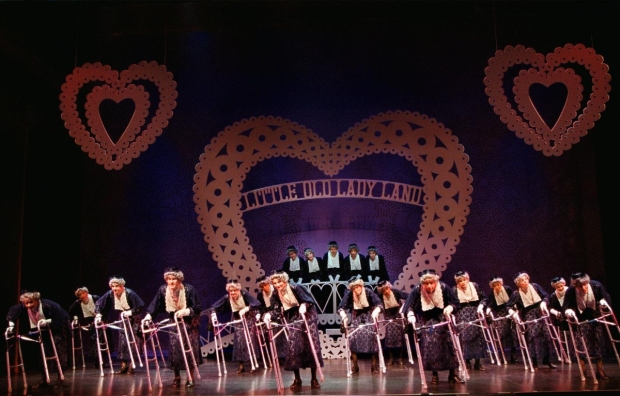

6. Mel Brooks wrote “Betrayed” at Nathan Lane’s request.
Feeling “Springtime for Hitler” was the apex of Act II, Brooks recalls Lane saying: “I’m the star of the show! There’s nothing for me do in the second act! I need something to do! I need an 11-o’clock number!” Pulling from a practice he’d perform routinely early on in his career — where he’d summarize his entire act for latecomers — Brooks wrote the rapid-fire recap based around a number wherein Max laments Leo’s disloyalty. “It was his only complaint,” says Brooks of the lack of the number, praising Lane’s consummate professionalism and talent to boot. And the result was, in Lane’s words — though we’re sure you’d all agree — “simply brilliant.”
7. “Along Came Bialy” almost… never came along.
“I was going to throw [it] out,” admits Brooks, telling Stroman, “‘I don’t like the tune. I don’t like what I’ve done with it. I think I could do better.’” The director protested, saying, “Wait! I’ve got an idea!” She came back the next day with the now-famous tap-dancing walker sequence… and the rest is theatre history. “No one works a prop like Susan Stroman,” says Cady Huffman. That’s for sure — they were helpless and hopeless no more!
8. The “German Ethel Merman” lyric was a nod to Brooks’ past.
At just nine years old, it was seeing the actress in Anything Goes that sparked his interest in musical theatre. (“I was so moved, I didn’t know what to feel,” he says). When writing “Springtime for Hitler,” he included a line to pay homage to her.
9. Max Bialystock’s opening costume is a nod to Mel Brooks’ “2000 Year Old Man.”
“He should have a cape, and a black hat that comes out on the sides,” Lane said he told costume designer William Ivey Long when discussing what such a flagrant character would wear on his opening night. “[Long] came up with the perfect outfit.” (“And it was so wonderful!” Brooks concurs. “You really opened the whole show with a bang!”) Well, he is the king of Broadway after all.
10. Cameron Mackintosh influenced “Keep it Gay.”
While in London directing Oklahoma! for the Royal National Theatre, Stroman stopped by Mackintosh’s house (he was a producer on the show) for a breakfast meeting to discuss the production process. “We were having this meeting and then [from upstairs] came down a set designer and then a costume designer, a lighting designer [etc.],” Stroman describes. “They just picked up a bagel and let us do our thing [but] another would come down, and another, and another. I said [to Cameron], ‘Who are all these people?’ and he said, ‘They’re working on my next show. I have the design team staying over with me.”
Lightbulb. “I rushed back to New York and said, ‘MEL! Cameron Mackintosh! He lives with all his designers!
They were all upstairs and they all came down!” Theorizing secret bedrooms all over the house, Brooks took the idea and ran with it, and DeBris’ cast of eccentric houseguests was unleashed.
11. Roger Bart originally auditioned for Franz.
“He was too little [in terms of energy] to be the playwright,” says Brooks. “He had to intimidate Bialystock and Bloom. It just wasn’t right.” “So, everybody let him go,” says Stroman. But the director had other plans. Running down the hall after him, she said, “You’ve gotta read something else.” And aren’t we glad he did?!
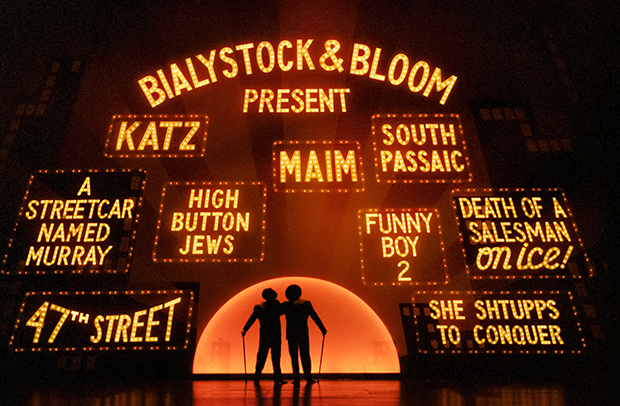

12. It could likely never be done today.
“Even then it was dangerous,” says Lane, regarding the musical’s blatant political incorrectness. Now, “you’d have 1,700 people triggered every night.” But even with all its swastikas and propaganda, the cast is adamant it was absolutely “the right show at the right time. “It was after a long period of the big British musicals,” Lane continues, “and it was a return to the musical with the emphasis on comedy….audiences were hungry for that kind of entertainment again.” In so many words, “It was a bit of a miracle.” So, too, was the case following 9/11, where cast and crew were worried about response to their show when they re-opened just two days after the attacks. As dark a period as it was and as afraid as people were to laugh — at actors glorifying Nazism, no less — “they needed it,” says Huffman. “It was the first time I ever realized, ‘Oh, what I do can actually [help] someone and be something for people. It was really gratifying.”
And as we emerge from our own pandemic bubbles, ever-mindful of political correctness, but eager to experience live theatre after what will ultimately be an 18-month hiatus, hopefully there’s a show or two out there that’ll act as The Producers of today, offering solace and reminding us that despite the hard times, it’s okay to forget for a bit and laugh. And knowing that, then perhaps we, too, can walk off into the sunset, knowing we’ve been through a hell of a ride, but we made it to the other side and we’re all the better for it.
Just like that seemingly unlikely duo of Leo and Max.
The Producers opened at the St. James Theatre (246 W. 44th Street) on April 19th, 2001. Stars in the House, hosted by Rudetsky and Wesley, airs daily Tuesday-Saturday at 8pm. For more information and/or make a tax-deductible donation to the Actors’ Fund, please visit www.starsinthehouse.com.




